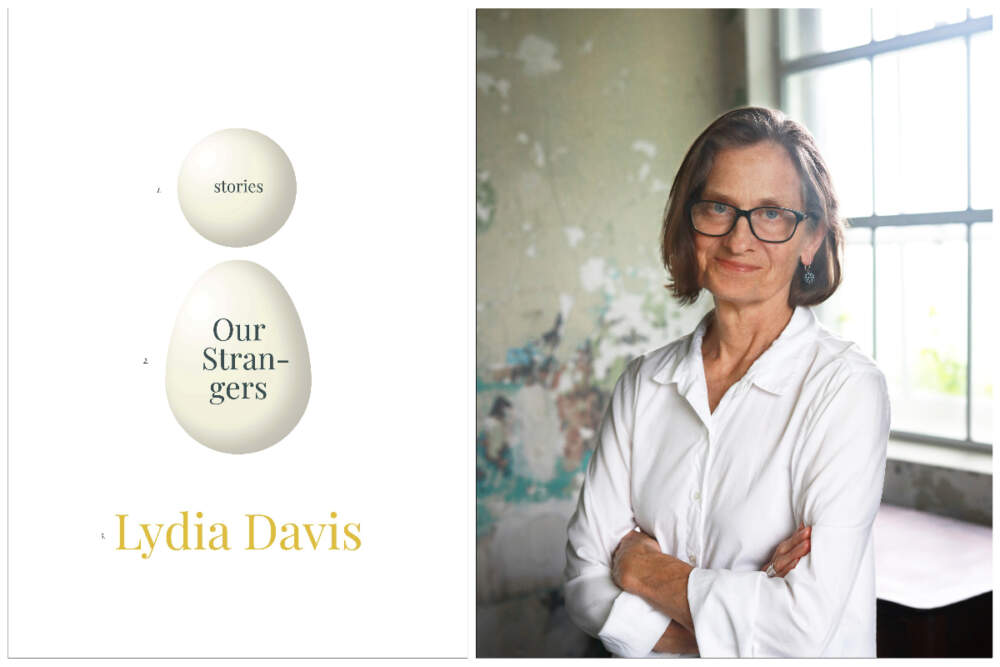Advertisement
Writer Lydia Davis on Amazon, climate change and her new fiction collection 'Our Strangers'
Lydia Davis has long been celebrated for her short, succinct stories, which manage to conjure up deeply affecting emotional landscapes with just a few lines — sometimes even just a few words. So it shouldn’t be surprising that she got right to the point when asked about why she is refusing to allow Amazon to carry her latest collection, “Our Strangers.”
“The deepest motivation was repugnance,” says Davis. “I have not been buying from Amazon because of their predatory business practices and their poor treatment of workers. There’s no ethical component, and above all no sense of community.” But it was only recently that she realized she could strike a blow as an author and not just as a consumer.

As a 2003 MacArthur Fellow and renowned translator who has produced much-lauded takes on Flaubert’s “Madame Bovary” and Proust’s “Swann’s Way,” it’s a stance that Davis can afford to take. But she recognizes that less-established authors may have a harder time following in her footsteps. “If other writers choose to go against them or omit them from the selling, I’d be delighted — but it wasn’t my primary motivation. I just felt I couldn’t do otherwise.”
Davis, who grew up in Northampton, Massachusetts and now lives in upstate New York, regrets not acting sooner. “It should have been important to me years ago,” she says. “I just didn’t wake up.” As her inspiration, she cites Dave Eggers’s decision to withhold the hardcover edition of his 2021 novel “The Every” from Amazon, and to only allow the retail behemoth to sell the paperback after a six-week moratorium. In partnership with Bookshop.org, Davis has ensured that “Our Strangers” will be available exclusively at brick-and-mortar bookstores and a few select independent online booksellers, bypassing Amazon entirely.
Davis’ stance against Amazon is only the latest example of trying to live her values in a world she feels may be on the brink of disaster. In 2020, she made the decision to give up flying in light of the impact that airline travel has on the environment. The threat of climate change weighs on her and Davis admits it has had a profound impact on her writing—particularly her output. “I do a lot less [writing], because whenever I read another piece of climate news I go out and plant another tree in my village or in my yard. I get caught up with doing what I can physically. It’s just one person’s small gesture but it’s the only way I can respond.”
“Our Strangers” is Davis’ first collection of fiction since 2014’s “Can’t and Won’t,” gathering up almost 150 pieces she’s developed over the last nine years. But the title story has been around for a lot longer, first appearing in print — albeit in a different form — back in 1983. “People are strangers to me,” it begins, leading into 11 numbered vignettes about the narrator’s nearby neighbors. Some are small and funny, as when the narrator imagines stealing a neighbor’s attractive oriental rug; others wax philosophical about kindness found in unlikely places or long-broken fences being mended in tough circumstances.
Advertisement
“Each section deals with a different neighbor situation; I thought it was finished when I had five of them,” says Davis. “Then more things would happen or occur to me and I thought, ‘I could add more sections.’ The first were written a long time ago and the latest in just the last 4 or 5 years.”
Davis’ signature as a writer is her ability to wrest profound insight out of tiny, quotidian observations, something she attributes to her voracious note-taking. “I write things down obsessively,” she tells me. “Usually I’m just struck by a thought or something I heard and I write it down. Then I have this material, and when I return to it, I might say ‘Well, that’s enough for a whole little tiny story,’ or decide that it needs a little more.”
As in the title story, much of Davis’ work in this collection is concerned with the tenuous nature of our connections to other people; there’s an undercurrent of yearning in many of the pieces, of people desperate to both see and be seen by others. In “Pardon the Intrusion,” she emulates a local online message board, where people are seeking items for cheap or looking to offload their old belongings. “I’d be grateful if someone could recommend a good dentist in the area,” reads one. “Dear colleagues, my daughter’s calculator died,” reads another. Individual excerpts can’t properly convey the way the posts collectively transcend their mundanity to become a rich, multifaceted portrait of a community’s needs and desires.
“Winter Letter,” one of the book’s longer pieces, is framed as a mother’s letter to her older children, in which she describes a vacation she’s on with her husband. “Dear Kids, I’ll try not to let this go on forever, because Dad gets restless if I’m busy at something for too long.” For a great stretch, it’s tedious and fumbling, irritating in its minutiae and cloying effervescence. And then, suddenly, it’s utterly heartbreaking, and you see finally where Davis has been leading you all along. By the end, you’ll want to go and give your mother a hug.
For an author as prolific as Davis, her collections are an opportunity to reacquaint herself with her past work. “Sometimes I haven’t revisited a story in a long time,” she says, “and I enjoy it as if I haven’t read it before.” It’s a quality her long-time readers are no doubt familiar with. The subtleties and specificities in Davis’ stories make them a pleasure to revisit, and with fresh eyes and more experiences under your belt, they manage to feel brand new each time.
